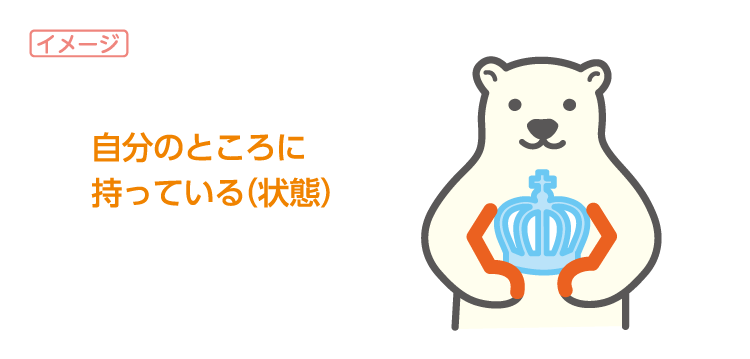❶持っている, 所有している, ~がある
I have a book in my hand.
♔基本I have a book in my hand.
私は手に1冊の本を持っている.
⦣ have+名詞.
✓POINT
「持っている」の意味では進行形 (be having) にしない.
❷ の最後の用例
I have two brothers.
I have two brothers.
私には兄弟が2人いる[私は3人兄弟です].
*会話*
How many brothers does he have?—He has two brothers.
Does your father have a car?—Yes, he does./No, he doesn't (have a car).
あなたのお父さんは車をお持ちですか.—はい, 持っています./いいえ, 持っていません.
You have a good memory.
You have a good memory.
君は記憶きおく力がいい.
Do you have a car?
Do you have a car?
車はお持ちですか.
Do you have any money with you?
Do you have any money with you?
君はお金を持ち合わせていますか.
⦣ with you は「君といっしょに, 身に着けて」.
I don't have any money with me.
I don't have any money with me.
私はお金を1銭も持ち合わせていません.
Do you have Bob's telephone number?
Do you have Bob's telephone number?
ボブの電話番号を知ってる?
I have a dog and two cats.
I have a dog and two cats.
私私は犬を1匹と猫を2匹飼っている.
She has blue eyes.
She has blue eyes.
彼女は目が青い.
This dictionary has a red cover.
This dictionary has a red cover.
この辞書の表紙は赤い.
He had a camera, but I didn't have one.
He had a camera, but I didn't have one.
彼はカメラを持っていたが私は持っていなかった.
⦣ one=a camera.
*会話*
Did you have your camera at that time?—Yes, I did. I had my camera then.
君はその時自分のカメラを持っていた?—ええ, 持っていました. その時私は自分のカメラを持っていました.
He has had a lot of experience in teaching English.
He has had a lot of experience in teaching English.
彼は英語を教えた経験がたくさんある.
⦣ 現在完了かんりょうの文. had は過去分詞. have助動❷
Happiness lies in having many good friends.
Happiness lies in having many good friends.
幸せはたくさんのよい友達を持っていることにある.
⦣ 前置詞 in+動名詞 having (持つこと).
❷(経験として)持つ, ~する; 食べる, 飲む; (病気に)かかる
✓POINT
次にくる目的語によって日本語の訳語を適当に変える.
have a good time
have a good time
楽しい時間を過ごす
have breakfast
have breakfast
朝食を食べる
have a bad cold
have a bad cold
ひどい風邪かぜをひいている
have a bath [a walk]
have a bath [a walk]
おふろに入る[散歩する]
have a talk with him
have a talk with him
彼と話す
We have no school on Sundays.
We have no school on Sundays.
日曜日には学校がありません.
How many classes do you have on Friday?—We have five classes.
会話How many classes do you have on Friday?—We have five classes.
金曜日には授業が何時間ありますか.—5時間です.
We had a pleasant evening.
We had a pleasant evening.
私たちには楽しい晩でした.
We had a rain shower this afternoon.
We had a rain shower this afternoon.
きょうの午後にわか雨が降った.
We had a swim in the river.
We had a swim in the river.
私たちは川でひと泳ぎした.
*会話*
Won't you have some more fruit?—No, thank you. I've had enough.
もう少しフルーツを召めし上がりませんか.—いいえ, けっこうです. もう十分いただきました.
⦣ I've I have had enough. は現在完了の文 (have助動❶). have は助動詞で had が本動詞(の過去分詞).
We are just having dinner.
We are just having dinner.
私たちはちょうど夕食を食べているところです.
⦣ 現在進行形の文. are助動❶
